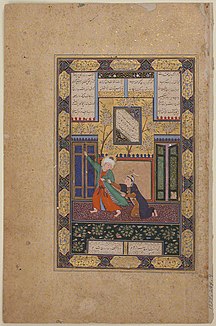Yusuf and Zulaikha

Yusuf and Zulaikha (Joseph pursued by Potiphar's wife), miniature by Behzād, 1488.

Joseph in Zuleikha's party. Painting in Takieh Moaven ol molk, Kermanshah, Iran
"Yusuf and Zulaikha" (the English transliteration of both names varies greatly) refers to a medieval Islamic version of the story of the prophet Joseph and Potiphar's wife which has been told and retold countless times in many languages spoken in Muslim world, such as Arabic, Persian, Turkish and Urdu. Its most famous version was written in Persian language by Jami (1414-1492), in his Haft Awrang ("Seven Thrones"). The story has by then many elaborations, and is capable of a Sufi interpretation, where Zulaikha's longing for Yusuf represents the soul's quest for God.
Contents
1 Other versions of the story
2 Yousuf and Zulaikha in Asia
3 References
4 External links
Other versions of the story
Other writers to have retold the story include: Mahmud Gami (Kashmiri). It is a standard tale used in Punjabi Qisse.
There exists as well a long poem on the subject, titled as Yusuf and Zalikha, which used to be attributed to Ferdowsi, the great Persian poet of the tenth and eleventh century, however, the scholars have rejected this book based on its low quality and the time line of Ferdowsi's life.[1]
Yousuf and Zulaikha in Asia

A painting of Yusuf and Zulaikha, from the Metropolitan Museum[2] collection.
As in many other Muslim countries, the narrative of the epic love of Yousuf and Zulaikha was covered in classic literary works of East Bengal (modern day Bangladesh): in the 14th century A.D. (during the reign of Sultan Ghiyasuddin Azam Shah), Shah Muhammad Sagir wrote in Bengali a version of Yusuf-Zulekha which is considered one of the greatest literary works of medieval "golden era" of Bengali literature.
References
^ 'Yusuf and Zalikha: The Biblical Legend of Joseph and Potiphar's Wife in the Persian Version Ascribed to Abul-Mansur Qasim, Called Firdausi, ca. 932-1021 A.D.,' Edited by Hermann Ethé, Philo Press, Amsterdam, 1970
^ "Yusuf And Zulaikha". www.metmuseum.org. Retrieved 2018-12-19..mw-parser-output cite.citationfont-style:inherit.mw-parser-output .citation qquotes:"""""""'""'".mw-parser-output .citation .cs1-lock-free abackground:url("//upload.wikimedia.org/wikipedia/commons/thumb/6/65/Lock-green.svg/9px-Lock-green.svg.png")no-repeat;background-position:right .1em center.mw-parser-output .citation .cs1-lock-limited a,.mw-parser-output .citation .cs1-lock-registration abackground:url("//upload.wikimedia.org/wikipedia/commons/thumb/d/d6/Lock-gray-alt-2.svg/9px-Lock-gray-alt-2.svg.png")no-repeat;background-position:right .1em center.mw-parser-output .citation .cs1-lock-subscription abackground:url("//upload.wikimedia.org/wikipedia/commons/thumb/a/aa/Lock-red-alt-2.svg/9px-Lock-red-alt-2.svg.png")no-repeat;background-position:right .1em center.mw-parser-output .cs1-subscription,.mw-parser-output .cs1-registrationcolor:#555.mw-parser-output .cs1-subscription span,.mw-parser-output .cs1-registration spanborder-bottom:1px dotted;cursor:help.mw-parser-output .cs1-ws-icon abackground:url("//upload.wikimedia.org/wikipedia/commons/thumb/4/4c/Wikisource-logo.svg/12px-Wikisource-logo.svg.png")no-repeat;background-position:right .1em center.mw-parser-output code.cs1-codecolor:inherit;background:inherit;border:inherit;padding:inherit.mw-parser-output .cs1-hidden-errordisplay:none;font-size:100%.mw-parser-output .cs1-visible-errorfont-size:100%.mw-parser-output .cs1-maintdisplay:none;color:#33aa33;margin-left:0.3em.mw-parser-output .cs1-subscription,.mw-parser-output .cs1-registration,.mw-parser-output .cs1-formatfont-size:95%.mw-parser-output .cs1-kern-left,.mw-parser-output .cs1-kern-wl-leftpadding-left:0.2em.mw-parser-output .cs1-kern-right,.mw-parser-output .cs1-kern-wl-rightpadding-right:0.2em
External links
Wikisource has original text related to this article: Joseph and Zuleika |
"English translation of Jami's Joseph and Zuleika (edited by Charles Horne, 1917)" (PDF). (138 KiB)
Women Writers, Islam, and the Ghost of Zulaikha, by Elif Shafak
